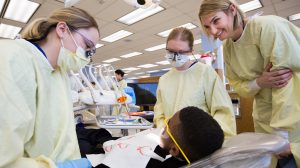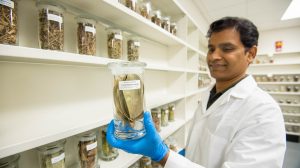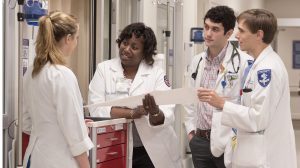
Students at the UM Medical Center’s School of Dentistry provide free dental care to students from a Jackson elementary school. Photo courtesy UMMC
OXFORD, Miss. – It is no secret that many Mississippians face health challenges, but the University of Mississippi and the state’s other public universities are attacking these challenges on many fronts.
Universities treat patients, train the next generation of health care providers and conduct research that will help prevent disease and improve outcomes. While Mississippi’s health issues cannot be solved overnight, progress is being made every day.
Most of the UM health care outreach is housed at the Medical Center in Jackson, the state’s only academic medical center. UMMC encompasses seven health sciences schools: medicine, nursing, health related professions, dentistry, graduate studies, population health and the clinical component of the School of Pharmacy.
The health care enterprise includes the state’s only Level I trauma center, its only children’s hospital and the state’s only organ and bone marrow transplant programs.
The Jackson Heart Study, which UMMC leads along with Jackson State University and Tougaloo College, is the country’s largest long-term study focusing on cardiovascular disease risk in African-Americans.
The Medical Center’s Center for Telehealth is a national leader in providing high-quality health care, especially for rural Mississippi areas with little access to both primary and specialty care. UMMC’s education, research and health care missions share the objectives of improving the health of the state’s population and eliminating health disparities.
The UM School of Pharmacy is ranked 14th in the nation for external research funding. Four research centers contribute to the school’s research mission: the Center for Pharmaceutical Marketing and Management, the Pii Center for Pharmaceutical Technology, the Center for Clinical and Translational Science, and the largest of the four, the National Center for Natural Products Research.
The NCNPR is the nation’s only university-based research program devoted to the discovery and development of natural product-derived pharmaceuticals and agrochemicals to benefit human health and contribute to disease therapies. The School of Pharmacy is also actively involved with Community-Based Research Programs that demonstrate pharmacists’ positive impact on public health by integrating medication therapy management services into the underserved Mississippi Delta.
Also working toward improving the health of the state’s population and eliminating health disparities is Jackson State University’s School of Public Health, the state’s only School of Public Health.

Research scientist Vijayasankar Raman works in the UM Natural Products Training Center. Photo by Kevin Bain/Ole Miss Communications
The school is focused on disease prevention to help curb soaring medical costs associated with treating worsening health conditions. Research possibilities are expected to be enormous as the new school examines, for example, why life expectancy for black Mississippians is less than that of Caucasians.
Mississippi University for Women’s Department of Health and Kinesiology serves approximately 300 students and offers a Master of Public Health degree, Bachelor of Science or Bachelor of Applied Science in Public Health Education, and a B.S. in Kinesiology.
The kinesiology degree includes options in exercise science, physical education, and pre-physical therapy. The department also houses a pre-occupational therapy program and minors in exercise science and public health education.
The department strives to promote healthy living with an emphasis on physical activity, sport and exercise. Graduates are prepared to work as practitioners in schools, communities, worksites, health care settings and government agencies.
MUW is making an impact in the community and beyond through outreach and service activities. Nursing students and faculty provided 311,374 hours of service to 121,948 clients last year.
The university’s Passport to Wellness, funded by Blue Cross-Blue Shield of Mississippi Foundation, encourages better health through diet and exercise. In the last year, the program held 19 events and served approximately 1,500 participants. The inaugural Imagine. Inspire. Challenge Symposium last year, focusing on heart disease in underserved communities, drew more than 500 participants.
The MUW Culinary Arts Institute’s Project CHEW, or Cook Healthy, Eat Well, trailer offers tips regarding healthy cooking techniques and recipe modifications. Healthy eating samples were provided to about 2,700 patrons at 25 events.
The College of Nursing at the University of Southern Mississippi recently was awarded a $1.2 million grant through the Health Resources and Services Administration that will be used to provide specialized training for students in the Family Nurse Practitioner or Psychiatric Mental Health Nurse Practitioner programs.
The Advanced Nursing Education Workforce grant will enable the college to distribute traineeship funds for students who plan to work in underserved areas after completing the advanced programs.
The grant will provide longitudinal immersion clinical practice experiences in primary care and behavioral health care facilities. The grant is focused on students already certified in one of these specialties and who are seeking a second certification, along with a Doctor of Nursing Practice degree.
The two-year grant is the first of its kind obtained by the USM College of Nursing. The grant proposal stemmed from an identified need in Mississippi: to produce advanced-practice nurses prepared at the highest degree level who are dually certified for health care providers delivering holistic care.
Some of these nurses may treat influenza patients, but scientists at Mississippi State University want to make getting the flu something of the past. To eradicate risk, scientists must find a way to stay at least one step ahead of virus mutations, so MSU students and faculty are collaborating with global research teams to peer into the future and develop new defenses against flu’s mounting threat.
Powered with a major grant from the National Institutes of Health and led by MSU’s Henry Wan, researchers are helping accelerate expensive, time-consuming analysis conducted by thousands of scientists at more than 130 influenza centers in 106 countries. The goal of the team is to help prevent, diagnose and treat pandemic flus and other illnesses.
The Mississippi State team’s “machine learning” and “big data” process takes the analysis out of research labs and instead uses computational methods to discover critical changes or mutations among viruses more quickly. This information is entered into a computerized model that determines the best vaccines for combating new and existing strains.
The model also translates data into mathematical formulas that generate maps and provide an in-depth look at flu viruses over time and in different populations. This kind of mapping helps track how viruses mutate and how they spread, leading to greater understanding and discoveries, such as the fact that one particular virus vaccine has been updated more than 29 times since 1968.
The MSU Extension 4-H Program, in partnership with the UM Medical Center and the UMMC/Myrlie Evers-Williams Institute, are developing the next generation of health care professionals through the Junior Master Wellness Volunteers program. The program is a community health education and volunteer leader that partners with students in various disciplines such as the allied health courses, family and consumer science courses and individually focused clubs or organizations for training and delivery of health messages into the community.
Junior Master Wellness volunteers are teens focused on wellness and dedicated to serving their community. Anyone between ages 15 and 18 with an interest in leadership, advocacy, extending knowledge, serving as role models and volunteering aimed at improving health literacy and healthy lifestyle choices may enroll for training as a volunteer.
The county extension agent maintains an engaged role with teachers and students providing community service opportunities and programmatic oversight. Recruitment is also sought for a health competition event conducted annually at 4-H State Congress.
